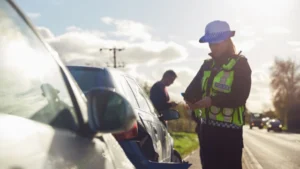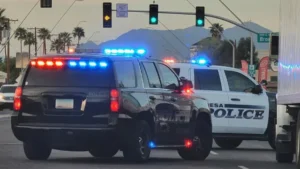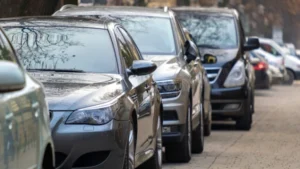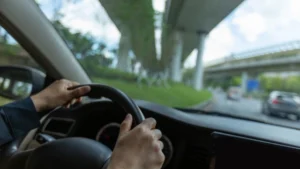
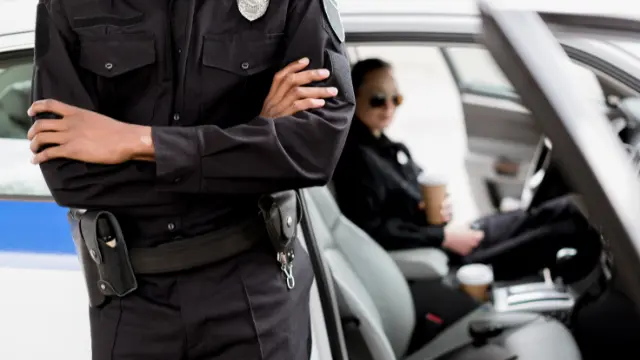
Understanding the Seriousness of Evasion
Picture this: You’re driving home when you see flashing blue and red lights in your rearview mirror. Panic sets in. Maybe you were speeding, maybe you missed a stop sign—but instead of pulling over, you keep going, thinking you can turn onto a side street and avoid the ticket. Moments later, you’re facing police evasion charges, which are far more severe than a simple traffic offense.
Evading law enforcement is a serious criminal offense with severe penalties. What might seem like a brief moment of bad judgment can result in jail time, hefty fines, and a suspended driver’s license. Understanding the law, possible defenses, and sentencing factors can make all the difference if you or someone you know is facing such charges.
Police Evasion: What the Law Says
Police evasion occurs when a driver willfully fails to stop for law enforcement after being signaled to pull over. This can include ignoring a siren, speeding away, or attempting to flee on foot after stopping. The law views these actions as deliberate attempts to escape legal consequences, making evasion a more severe charge than standard traffic offenses.
Types of Police Evasion Charges
- Misdemeanor Evasion: Failing to stop but without dangerous driving behavior.
- Felony Evasion: Involves high-speed chases, reckless driving, or endangerment of others.
- Aggravated Evasion: Includes driving under the influence, causing injury, or using a vehicle as a weapon against law enforcement.
In California, under Vehicle Code 2800.1 VC, simply failing to pull over can result in up to one year in jail, while reckless evasion (2800.2 VC) can escalate to prison time.
Traffic Offenses That Can Lead to an Evasion Charge
A simple traffic offense can escalate into an evasion charge if a driver refuses to comply with police instructions. Common violations that lead to evasion include:
- Speeding
- Running a red light or stop sign
- Driving without a valid license
- Expired registration
- DUI suspicion
While the initial offense may have been minor, fleeing from police instantly turns a traffic violation into a criminal case.
The Legal Consequences of Evading Police
The penalties for evading law enforcement vary by state but often include:
- Fines: Ranging from $500 to $10,000, depending on severity.
- Jail or Prison Time: Misdemeanor evasion can result in up to one year in jail, while felony evasion can lead to several years in prison.
- Driver’s License Suspension: Many states impose automatic suspensions for six months to several years.
- Probation or Community Service: Courts may impose alternative sentences for first-time offenders.
In Texas, evading arrest in a motor vehicle is a felony on the second offense, leading to up to 10 years in prison under Texas Penal Code 38.04.
Sentencing Factors in Evasion Cases
Judges consider several key factors when determining penalties for evasion of law enforcement:
- Speed and Recklessness: High-speed chases or driving that endangers the public increases penalties.
- Previous Offenses: Repeat offenders face harsher sentences.
- DUI or Drug Use: If intoxication was involved, the case could include additional felony charges.
- Injury or Property Damage: If the pursuit results in an accident or injury, penalties increase significantly.
- Endangering Bystanders or Police: Any action that threatens officers or civilians leads to aggravated charges.
Some judges offer plea deals for first-time offenders, allowing probation or reduced charges in exchange for community service and driver’s education programs.
How to Defend Against a Police Evasion Charge
1. Lack of Intent to Evade
Prosecutors must prove that the driver willfully attempted to evade the police. A strong defense may argue:
- The driver did not see or hear the police signal.
- The road conditions or traffic made stopping immediately unsafe.
- The driver panicked but did not intend to flee.
2. Mistaken Identity
In cases where multiple vehicles were involved, the defense may argue that law enforcement misidentified the driver.
3. Medical Emergency
If the driver was experiencing a medical crisis (such as a seizure or heart attack), an attorney may argue that they were not in full control of their actions.
4. Coercion or Fear for Safety
In some cases, individuals may fail to stop due to:
- Fear of police misconduct.
- A threat from a passenger in the car.
- Driving in an isolated area at night and seeking a well-lit, populated location before stopping.
Case Study: How One Driver Avoided a Felony Evasion Conviction
Background
Michael, a 35-year-old delivery driver, was pulled over for a broken taillight. Nervous due to a previous unpaid ticket, he continued driving for three blocks before stopping. By that time, police had called for backup, assuming he was attempting to flee.
Defense Strategy
Michael’s attorney built a defense around:
- Lack of Intent: He continued driving only to find a safe place to pull over.
- No Reckless Driving: He did not speed, run lights, or endanger others.
- Immediate Cooperation: Once stopped, Michael fully complied with the officers.
Outcome
Instead of a felony evasion conviction, Michael’s charges were reduced to a simple traffic violation, resulting in a fine instead of jail time.
Conclusion
Evasion of law enforcement is a serious criminal charge that requires immediate legal attention. If you or someone you know is facing this offense, consulting an experienced criminal defense attorney can help reduce penalties or fight the charges.
Frequently Asked Questions (FAQs)
- Is police evasion a felony or misdemeanor? It depends on the severity. Simple evasion is often a misdemeanor, while high-speed chases or reckless behavior can lead to a felony.
- Can I go to jail for evading the police? Yes. Misdemeanor evasion can result in up to one year in jail, while felony evasion can lead to prison time of several years.
- Can my license be suspended for evasion? Yes. Most states impose license suspensions ranging from six months to multiple years.
- What should I do if I’m being pulled over? Pull over immediately in a safe and legal location. Failing to stop can escalate into a criminal charge.
- How can I fight a police evasion charge? A defense attorney can argue a lack of intent, mistaken identity, or mitigating circumstances to reduce or dismiss the charge.
